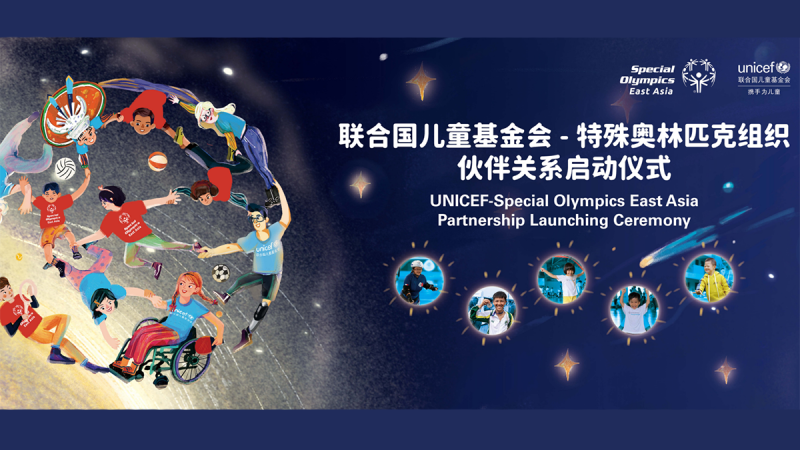UNICEF (United Nations Children’s Fund) China signed a memorandum of understanding with Special Olympics East Asia on Monday, 12 September, to formalize the two organizations’ partnership and enhance collaboration in China.
“We believe that working together with UNICEF will allow us to learn from one another, continue to leverage each other's expertise and advance the inclusion of people with disabilities so that we can bring them to greater heights in life,” said Freda M. Fung, Regional President and Managing Director of Special Olympics East Asia, in an interview with Xinhua.
She noted that sports could play a significant role in helping people with intellectual and developmental disabilities. Teaching and training them in the repetitive motions of sports can help enhance them both physically and mentally. “It will bring them much joy and a sense of achievement,” she added.
The first Special Olympics World Summer Games was hosted in 1968. Now Special Olympics East Asia is home to 1.74 million Special Olympics athletes and Unified partners.
The 2007 Special Olympics World Summer Games in Shanghai marked the first time that the event came to Asia. According to Fung, before the event, China had been hosting similar games at the national level. But the Special Olympics World Summer Games marked a significant milestone, promoting inclusion for individuals with intellectual and developmental disabilities across China.
Athlete Jia Sirui talked about the significance of sports in her life in a speech at the signing ceremony. At the 10th Special Olympics World Summer Games in Raleigh, United States, she captured one gold and one bronze in women's gymnastics. She then became a Special Olympics Global Messenger.
“Nothing is impossible so long as you work hard,” she said.
Hailing Jia’s story as “motivating”, Amakobe Sande, UNICEF Representative to China, said in her speech that the two organizations have been working together since 2009 are now formalizing their partnership in China.
“With Special Olympics, we share the common goal to promote the fulfillment of rights and inclusion for children and adolescents, especially those with disabilities.”
According to the Second National Sample Survey on Disability conducted in 2006, in China there were an estimated 1.75 million children with intellectual disabilities, accounting for around a third of all children with disabilities. Ms. Sande noted that UNICEF has been working in areas such as health, education, child protection and social policy to provide support to children with disabilities.
Talking about the partnership with Special Olympics East Asia, she told Xinhua that “there is no greater opportunity than sports to amplify the voices of these children, to send a message to society about inclusion.”
“Together, we will work to raise more awareness and visibility around children with disabilities, and to enhance opportunities for social inclusion through sports,” she said.










